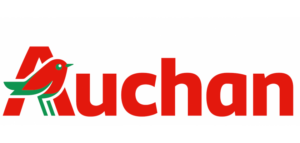Sustainable products will come to the fore at Auchan in the next two weeks
Thanks to its comprehensive sustainability strategy, Auchan Hungary is taking more and more powerful and effective steps for environmentally conscious operation. The company has set serious commitments for the coming period, for example, by 2030, they plan to reduce CO2 emissions from store operations (Scope 1 and 2) by 46%, and emissions outside of that (Scope 3) by 25%. Last year, they took several pioneering steps to eliminate plastic, and now in February, they want to draw attention to the importance of sustainability with their activity called Green Weeks.

For two weeks, sustainable products will be featured in Auchan Magyarország stores. The company builds its sustainability strategy along three main areas, one of the largest of which is the environment. These include, for example, energy efficiency, reducing the use of plastic, protecting biodiversity, promoting healthy eating, and reducing food waste, which are now receiving special attention during the Green Weeks campaign. The department store chain considers it very important to educate customers, so in addition to continuous communication, it tries to draw attention to the importance of the topic even more strongly from time to time.
Since 2019, the company has been taking consistent steps in the direction of sustainable operations, of which plastic elimination is a prominent part
To this end, last year they were the first among the supermarket chains to phase out single-use plastic bags. Instead of plastic packaging, they offer many environmentally friendly alternatives, such as the now iconic cardboard shopping box, alternative packaging in the fruit and vegetable department and the bakery department, and degradable, compostable versions for meat and fish. From the middle of February, they will arrive at another station, because from now on, some varieties of tomatoes will also be placed in sustainable paper boxes. In addition to being practical and made of 100% recycled paper, it is also stylish, and the proper ventilation ensures that the vegetables inside can stay fresh. Compared to previous plastic packaging, this laminated box made of corrugated paper is less sensitive to moisture and temperature fluctuations, which increases the shelf life of the product stored in it.
During these two weeks, the company also wants to help its customers make informed decisions during their purchases
In the promotional newspaper, they will support the navigation among the environmentally conscious product range with a number of attitude-shaping messages, and at the site with various signs. By the way, many terms and trademarks are currently used in trade to classify products, among which it is often not easy to recognize ourselves.
Here are some of the most commonly used terms:
1. Organic farming: Organic farming does not permit or restricts the use of various synthetic plant protection agents, artificial fertilizers, soil conditioners, artificial veterinary medicinal products or yield enhancers.
2. Eco/Bio/Organic products: Products that come from the system of organic farming.
3. Vegan food: Purely plant-based product. No ingredients of animal origin are used or added during its processing and production process.
4. GMO/GMO-free foods: Products without genetically modified ingredients. This mark provides a guarantee that the food bearing the label does not contain genetically modified organisms and does not contain ingredients produced by organisms. In the case of products of animal origin, the animals were not fed feed that contained genetically modified organisms.
5. From a responsible source: It comes from a verified and reliable source. The entire path of the food/raw material can be traced from the farmland to the packaged product. The production method of the product comes from a conscious, environmentally friendly agricultural method.
6. Sustainable forest management: One of the most common indications. In short, the FSC mark guarantees that the packaging material/cardboard box made with the use of wood and paper comes from a responsibly cultivated forest and a controlled source.
7. Biodegradable: Biodegradable plastics are those that are able to break down into elements and materials found in nature under specific, special conditions, under the influence of living organisms (microorganisms, fungi, etc.).
8. Recyclable: A type of plastic that is suitable for the process of making new objects and tools from it using the appropriate process. Not all materials can be recycled, so prior selection and awareness are important. The recyclable symbol can always be found on suitable plastics.
9. Reusable: Alternatives to disposable products. Since they can be used multiple times, they reduce the waste generated during the use of single-use plastics, which results from them being thrown away immediately.
10. Carbon footprint: The carbon footprint is an indicator that shows the impact of people, different organizations and countries on climate change. By calculating the carbon footprint, we can find out how much greenhouse gases enter the air directly and indirectly.
Related news
Top 5 sustainability trends in 2026 – a new era may begin
🎧 Hallgasd a cikket: Lejátszás Szünet Folytatás Leállítás Nyelv: Auto…
Read more >Hétéves növekedési stratégiát jelentett be az Auchan
🎧 Hallgasd a cikket: Lejátszás Szünet Folytatás Leállítás Nyelv: Auto…
Read more >Related news
EY Businessman of the Year: Tibor Veres is the grand prize winner, six special awards were also given out
🎧 Hallgasd a cikket: Lejátszás Szünet Folytatás Leállítás Nyelv: Auto…
Read more >The government is supporting dairy farmers with a new measure
🎧 Hallgasd a cikket: Lejátszás Szünet Folytatás Leállítás Nyelv: Auto…
Read more >









